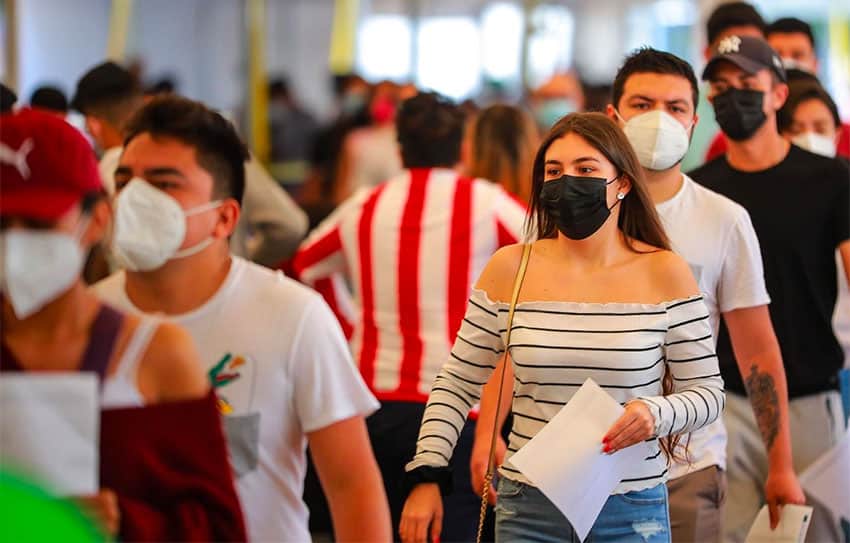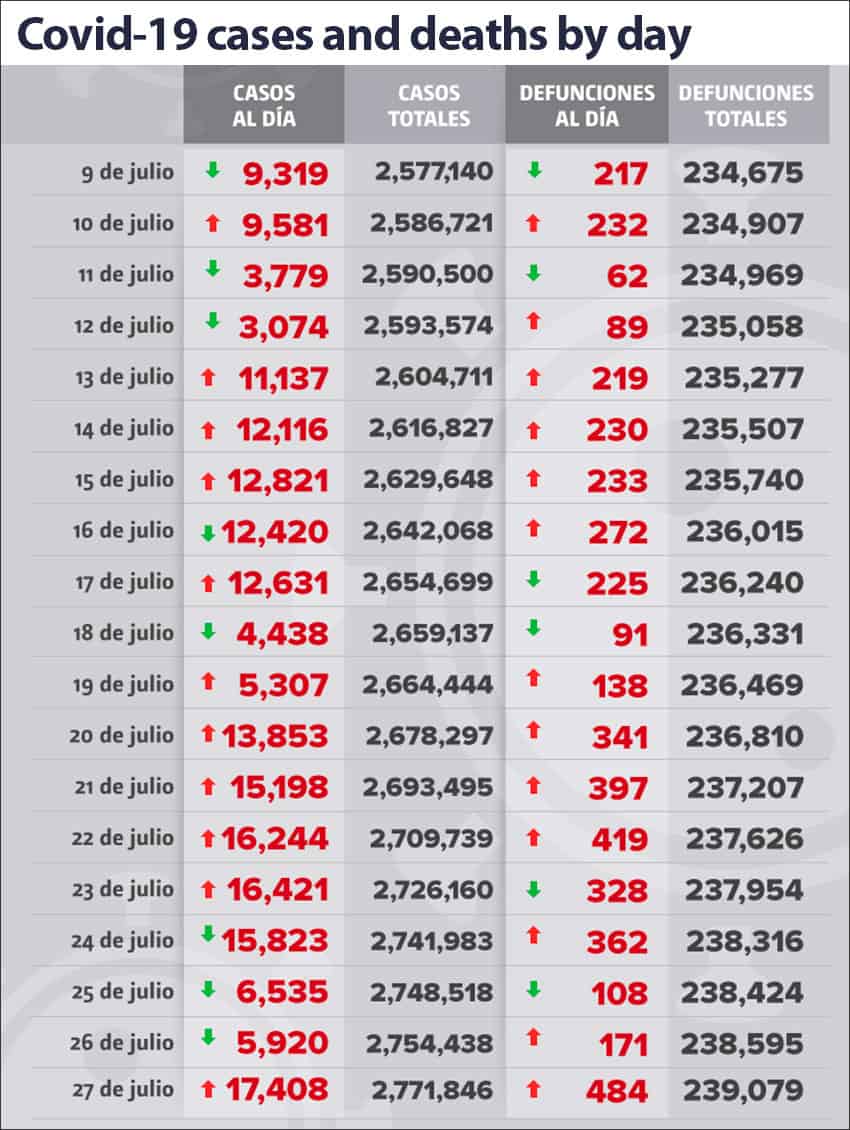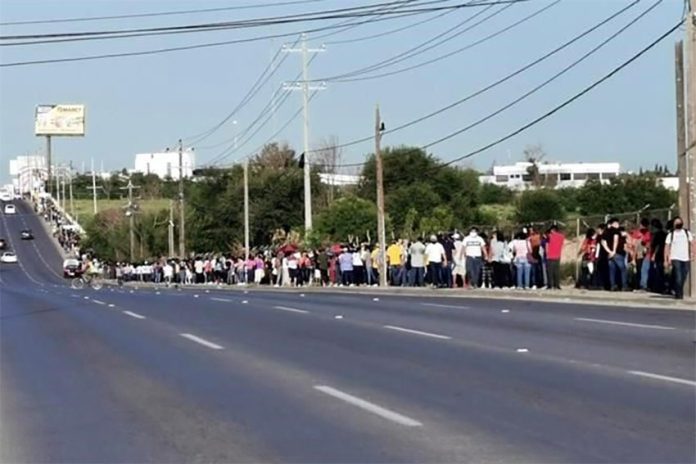Although Mexico’s vaccination rate continues to rise, the coronavirus pandemic still has significant potential to increase, according to a medical expert.
Mexico is currently amid a third wave of the pandemic with daily case numbers approaching the peaks recorded during the second and worst wave – which began in late 2020 and extended into early 2021 – on several days this month. The Health Ministry reported 17,408 new cases and 484 Covid-19 deaths on Tuesday, lifting the accumulated tallies to 2.77 million infections and 239,079 fatalities.
Figures for both cases and deaths are considered vast undercounts due to Mexico’s low testing rate.
A daily average of 9,355 new cases was reported in the first 27 days of July, a 166% increase compared to June but still well below the average of 14,134 in January – the worst month of the pandemic for both infections and deaths.
Reported deaths have averaged 223 per day this month, a reduction of 29% compared to June and 79% compared to January. The decline indicates that vaccination is saving thousands of lives, even though only one in five Mexicans is fully vaccinated.
Fueling the current coronavirus outbreak is the highly contagious Delta strain, which is now circulating widely.
According to a professor at the San Luis Potosí Autonomous University’s Medical School and Center for Health Science Research and Biomedicine, the situation could get much worse.
“The potential of this epidemic is very large and it is growing very rapidly,” Dr. Andreu Comas told the Associated Press (AP).
The new wave of the pandemic is “hitting the bulk of the population,” he said, referring to the more than 60 million Mexicans aged 16 to 55.
“It is the population that moves the most because on one hand it is the country’s economic engine and on the other it is the population with the most social life,” Comas said.
Dr. Francisco Moreno Sánchez, an infectious diseases expert and head of the Covid-19 unit at the ABC medical center in Mexico City, noted that most people in the younger part of that cohort are unvaccinated and thus remain vulnerable to infection.

Some young people are apparently unconcerned about catching the virus.
“I’m not worried about getting infected because I’m young,” 21-year-old Mario Estrada Flores told AP while hanging out and rapping with unmasked friends in a park in Coyoacán, a borough in the capital’s south.
“I have more defenses than an older person, … we have the idea that since we’re young nothing bad is going to happen to us or if we do get it it’s not going to be so strong.”
Not wearing a mask “is a little ignorant on our part because we’re taking a risk and we have older relatives, and we also put them at risk,” Estrada said.
Everyone aged 60 and over in Mexico has had the opportunity to be fully vaccinated and most in the 30-59 bracket have had the chance to get at least one shot. However, almost 4 million seniors and 3.6 million in the 50-59 age bracket remain unvaccinated, Health Ministry data shows.
Almost 62 million Covid-19 vaccine doses have been administered since inoculation began on December 24 but only 19% of Mexico’s 126 million strong population are vaccinated, according to The New York Times vaccinations tracker, while 34% have had at least one shot.
Among adults, the rate rises to 48%, according to the most recent federal data, which doesn’t take Mexicans vaccinated in the United States into account. That figure will continue to rise in the coming weeks as the federal government rolls out vaccines to millions of Mexicans in the 18-29 age bracket and attempts to boost vaccination levels in the five states with the lowest rates.
The inoculation of the country’s youngest adults began in Baja California last month after the United States donated more than 1.2 million single-shot Johnson & Johnson doses, and people in the 18-29 bracket have also received shots in some other states including Mexico City and Tamaulipas.
Lines of young people that stretched for kilometers were seen in the border city of Reynosa on Tuesday as eager jab-seekers flocked to vaccination centers.
President López Obrador has pledged to offer vaccines to all Mexicans free of charge but expressed skepticism on Tuesday about the need for booster shots.
“… We have to find out if they’re needed or not. [We won’t be] subjugated, subordinated by the pharmaceutical companies telling us that a third or fourth dose is needed,” he said.
However, there is growing evidence that booster shots will be needed, especially considering the virus’s potential to continue mutating.

Pfizer said Wednesday it believes people will need a third shot of its vaccine in order to maintain high levels of protection.
The United States pharmaceutical company said that data – which hasn’t been peer-reviewed or published – showed that a third dose of the vaccine developed by the German firm BioNTech generated antibodies against the Delta variant that are more than five times higher in people aged 18-55 and more than 11 times higher in those aged 65-85.
A third shot could be offered six to 12 months after the second shot of the Pfizer vaccine, which has been used in Mexico but not as widely as in some other countries such as the United States.
“All in all, I think a third dose would strongly improve protection against infection, mild moderate disease, and reduce the spread of the virus,” Pfizer’s chief scientific officer Mikael Dolsten said during a call to discuss the company’s quarterly results.
“… Receiving a third dose more than six months after vaccination, when protection may be beginning to wane, was estimated to potentially boost the neutralizing antibody titers in participants in this study to up to 100 times higher post-dose three compared to pre-dose three. These preliminary data are very encouraging as Delta continues to spread.”
With reports from AP, Reforma, EFE and Animal Político
